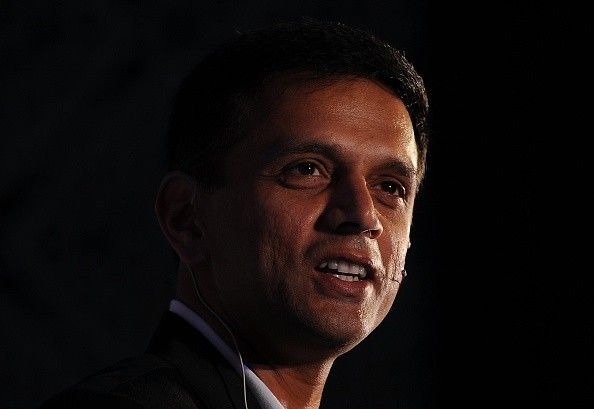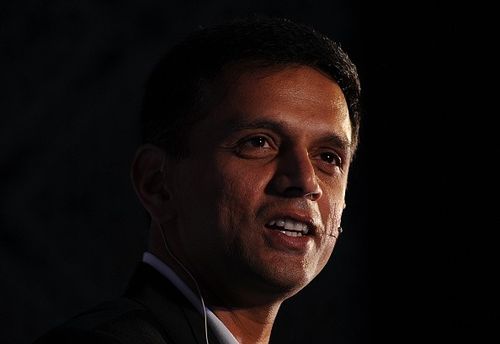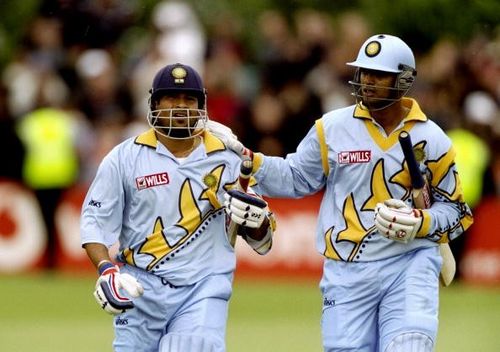
Why Rahul Dravid would be the perfect coach for India
Speaking at the Bradman Oration in Canberra, as the first non-Australian to ever be invited to deliver the prestigious speech, Rahul Dravid quoted the great Don himself saying,
“One of the things Bradman said has stayed in my mind. That the finest of athletes had, along with skill, a few more essential qualities: to conduct their life with dignity, with integrity, with courage and modesty. All this, he believed, were totally compatible with pride, ambition, determination and competitiveness. Maybe those words should be put up in cricket dressing rooms all over the world.”
If there was one cricketer who lived those words distilled to their truest essence, it was Dravid himself. He carries himself the way he played his cricket – self-effacing, modest, down-to-earth, honest.
‘Honest’ – now that is a strong word. How does honesty matter in a game that is being scrutinized so closely? A cricketer is not without his ethical dilemmas. But if ever there was a template for how you should play in a team, you need to look no further than Dravid.
For a country that has looked to foreign coaches to bring the national team up to the high standards of international cricket, India finally has, in Rahul Dravid, Sourav Ganguly and Anil Kumble, players who are amazing tacticians with great man-management skills. In other words, the country now has players who could be successful coaches at the highest level.
The coach doesn’t take instinctive decisions on the field, and cannot turn men into supermen. But a coach, especially in the Indian context, is also the binding material for a team that has members speaking different languages, coming from extremely diverse parts of the country and picked from varied backgrounds.
Cricket is a religion in India and a coach is instrumental in insulating the team, not just from the extreme distractions of an insane fan following, but also from the internal strife that could spring up in a dressing room full of diverse personalities.
Who have been India’s most successful coaches?
It is pertinent to take a look at the personalities of India’s two most successful coaches here. A coach is a partner to the captain, and John Wright and Sourav Ganguly struck an amazing partnership. Wright, as India’s first foreign coach, did a miraculous job of helping a team filled with young blood and recovering from the match-fixing quagmire pick itself up and reach the 2003 World Cup final.
The other successful coach, Gary Kirsten, went one step further, taking India to World Cup success in 2011 and also to the top of the ICC Test rankings.
If you can pick one person who fits the Kirsten-Wright mould perfectly, it is Rahul Dravid. All the three share a few traits:
- Self-effacing role models serving their country with distinction, without ever being superstars.
- No penchant for hogging the limelight.
- Quiet, soft-spoken and mild – personalities which are endearing, not imposing.
- Assertive, rarely meek, and always up to the task when it came to tough decisions.
- Excellent man-managers, who will get along well with every kind of dressing room personality.
Dravid’s attitude as a coach
As a player, the soft-spoken, well-mannered gentleman channelled all his energies and intensity into playing the game in the best possible way. He had very little time or energy to waste on rude gestures, unnecessary banter and needless hostility.
Dravid as the coach of the India A team continues to have the same air of grace and dignity about him. He has a calm that you need in your coach, given the players already have enough reserves of adrenaline.
Dravid slots in perfectly between jingoism and prosaicness, a mix of efficient involvement and critical detachment – both of which are important for a coach. Very often a coach brings his own personality and stamps it on the team. That could be disastrous as we saw during Greg Chappell’s reign, coincidentally during the time Dravid was the skipper.
But Dravid doesn’t impose. He moulds.
As a skipper, as a mentor or as a coach, Dravid has always talked about ‘nurturing’ as opposed to ‘shaping’. These verbs are important; a live example of his philosophy can be seen in what he said before taking up the coaching of the India A team.
He said: “I don't think you need to teach India A players to play or bat. They are there because they are successful. It's all about helping them reach the next level. At the under-23 level, basic coaching is not necessary. At that level, you are looking at someone who can be a guiding factor, someone who can help you by creating a good environment and sharing some of his experiences.”
Dravid doesn’t believe in altering the direction of flow of a natural talent. Instead, he would offer that precious guidance that could tell a player where they have gone wrong and what they have done well.
Bringing integrity and inclusiveness to the job
The reason some coaches like Kirsten, Waqar Younis and Darren Lehmann succeed where a lot of others fail is the integrity and inclusiveness of their own nature. It is easy for a coach to favour some players over others based on their personal bias. But that's not what these coaches did.
This is where Dravid too differs from the crowd. His awareness about Indian cricket and what constitutes it that is incredibly admirable. At the Bradman Oration, he didn’t defend Indian cricket, sometimes maligned in international circles, with controversial zealousness.
Instead, he pointed out, “As a player, as a proud and privileged member of the Indian cricket team, I want to say that, this one-dimensional, often cliched image relentlessly repeated is not what Indian cricket is really all about. I cannot take all of you into the towns and villages our players come from and introduce you to their families, teachers, coaches, mentors and teammates who made them international cricketers. I cannot take all of you here to India to show you the belief, struggle, effort and sacrifice from hundreds of people that runs through our game.”
This speech showed how amazing a brand ambassador Rahul Dravid can be for Indian cricket. He is someone who could weather storms in the mercurial world of Indian cricket through steps like:
· Creating a bench strength of the best players through opportunities, and then fitting them in the jig-saw puzzle by offering them the right roles
· Avoiding the select-first-fit-later policy that leads to trouble like in Rohit Sharma’s case when he was sent in at No. 3 in the first Test against Sri Lanka.
His own credibility as a team player
Rahul Dravid’s ability to blend in, sometimes even fade away, would serve the cause of the Indian team. He is probably cricket’s greatest sidekick. As a coach, he would likely inculcate the same spirit.
During an interview while coaching the India A team, he said: “I have mentioned to them that as much as we want to perform individually, it is about the team performing well. I think the selectors notice when players are playing for the team and not putting themselves ahead of the team.”
As a coach, Dravid, who always revelled in supreme confidence in his own abilities and always played for the team – even wicket-keeping at one point (the impressive 2003 World Cup campaign and the Natwest Trophy triumph in England) – will take the tough decision in the team’s favour and teach his players to do the same.
In fact, even as a coach, Dravid puts the team ahead of himself. Most people would be tempted to have wins on their resume in their first major coaching assignment. Instead, Dravid says: “These series are not only about results. I don't think you can say that we want to win every single A series.
"It is more about giving the players who have come to this level an opportunity to perform, and that is what we tried to do. Even in the one-day series, I tried to make sure that everyone got an opportunity to play. Some got just one game, but that is the bigger idea.”
In other words, Dravid was putting his own track record on the line, so every player got a chance to play and prove himself. Which player wouldn’t want to give his best for a man like that?
The track record so far
In IPL 2015, Dravid took Rajasthan Royals to the playoffs after mentoring them in a heart-breaking campaign in 2014. But more importantly, India A is suddenly churning out players who could seamlessly make it to the next level. The team won the triangular tournament played alongside A teams from Australia and South Africa, with young turks like Gurkeerat Singh and Mayank Aggarwal playing important roles.
And while they lost an unofficial four-day Test against Australia, the team showed plenty of grit when they saved another game against South Africa A.
Dravid understands his job – using the A team as a pipeline for the seniors’ team more than as an individual’s resume. The A team has already helped many players. While seniors like Virat Kohli used the opportunity to prepare for the Sri Lanka tour, Dravid also helped the younger lot including Naman Ojha, Lokesh Rahul and Karun Nair gain some confidence.
Dravid’s commitment towards providing the right goods for each player instead of force-feeding them with a common formula is commendable. He pointed out, “Each player is looking for something different. It is your job as the coach and support staff to provide that environment which helps him.”
Dravid doesn’t even take the support and ground staff for granted. It's not without reason that he is one of India’s most adored cricketers.
The most eager student
Dravid’s inquisitiveness shows when he says, “Having spent a couple of years as role of mentor after having spent many years as a player, I have been able to see things from the management and coaching side. The more you do it, the better you become.’’
Dravid will always be, irrespective of his role, the most eager student in the room, trying to do things better. He has spoken about the need, as a coach, to understand when to intervene and when not to, and how to intervene when it is eventually required. He is a great student, not just of the game, but of the sportsmen too, something that will always help in the modern era where every cricketer is under a lot of spotlight, stress and duress.
To summarise, here are the five reasons why Dravid would be the perfect coach for the Indian national team:
- He will always be well respected for his accomplishments.
- He always puts the team ahead of himself, even as a coach, even when his reputation is at stake.
- He is an excellent man-manager and communicator – well-read, eloquent and self-effacing.
- He has the ability to appreciate every player.
- He is professional and scientific in his approach to the game.



